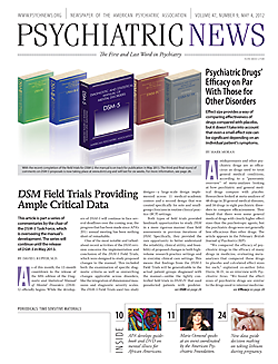Do the risks of antidepressant therapy during pregnancy outweigh the advantages? Does a pregnant woman’s use of selective serotonin reuptake inhibitors (SSRIs) do harm to her baby? Those are questions researchers based at the Department of Psychiatry at Weill Cornell Medical College kept in mind as they performed a critical review of clinical and translational findings regarding the relationship between persistent pulmonary hypertension of the newborn (PPHN) and exposure to SSRIs during pregnancy.
Lead author Mallay Occhiogrosso, M.D., an assistant professor of psychiatry at Weill Cornell Medical College, and her colleagues published their findings in the February American Journal of Psychiatry.
“Recent animal and clinical studies have illuminated the role of serotonin in the development of pulmonary hypertension and the possible differential effects of SSRIs on pulmonary vasculature in adults and fetuses,” they noted. “Informed clinical judgment is needed to balance the risk of this rare condition against the risk of untreated or undertreated depression.”
They found that the clinical literature on PPHN due to SSRI exposure consists of six studies and identifies a total of 50 infants with PPHN among an estimated 25,000 who were exposed to SSRIs. Two of the studies examined the same population database—with the second study including additional, more recent births—finding overall relative risks of 3.44 and 3.57. A third study found an increased risk only if exposure occurred in the second half of pregnancy. The other three studies found no increased risk of PPHN related to SSRI exposure.
“It is difficult to study SSRI-associated PPHN because the condition is so rare,” the researchers concluded.
They also found it a challenge to distinguish the impact of SSRIs from the impact of depression on the risk for PPHN, citing studies showing that obesity and smoking—established risk factors for PPHN—occur more commonly in depressed women, and those that show both unmedicated depression and treatment with SSRIs during pregnancy have been linked to reduced length of gestation and increased risk of premature birth, another risk factor for PPHN.
Another study of the effects of SSRIs on pregnancy outcomes was published online March 5 in the Archives of General Psychiatry. Hanan El Marroun, Ph.D., a postdoctorate fellow in the Department of Child and Adolescent Psychiatry at Sophia Children’s Hospital and Erasmus Medical Center in Rotterdam, the Netherlands, and colleagues examined the effects of maternal SSRI use during pregnancy on fetal growth and birth outcomes as part of the Generation R Study, a prospective population-based study from fetal life onward that included 7,696 pregnant women.
SSRI use in the study population was assessed by questionnaires in each trimester and verified by pharmacy records. Using depressive symptom scores from the Brief Symptom Inventory, 8,027 pregnant mothers (91.3 percent) had no or low depressive symptoms, 570 pregnant mothers (7.4 percent) had clinically relevant depressive symptoms and used no SSRIs, and 99 pregnant mothers (1.3 percent) used SSRIs.
To assess the babies, fetal sonography was performed in each trimester. Fetal body and head growth was determined with repeated assessments of body and head size, and birth outcomes studied were preterm birth, small for gestational age, and low birth weight. The researchers found that untreated maternal depression was associated with slower rates of fetal body and head growth. Pregnant mothers treated with SSRIs had fewer depressive symptoms, and their fetuses had no delay in body growth but had delayed head growth and were at increased risk for preterm birth.
“Our findings further raise the question of whether maternal SSRI treatment during pregnancy is better or worse for the fetus than untreated maternal depression. Clinicians must carefully weigh the known risk of untreated depression during pregnancy and the possible adverse effects of SSRIs,” they wrote, noting that further research on the implications of these findings is needed.
In an editorial that accompanied the work of Occhiogrosso and colleagues in the
American Journal of Psychiatry, Margaret Spinelli, M.D., an associate professor of clinical psychiatry at the College of Physicians and Surgeons of Columbia University and a research psychiatrist at the New York State Psychiatric Institute, agreed. “We now need to communicate clearly about the risks and benefits of treatment of depressed pregnant women if we wish to avoid similar adverse consequences to their well-being and the well-being of their infants,” wrote Spinelli, who is also the director of the Women’s Program in Psychiatry at Columbia University.

